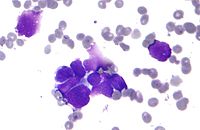
Photo from wikipedia
The tyrosine kinase inhibitor (TKI) cabozantinib might impede the growth of the sunitinib-resistant cell lines by targeting MET and AXL overexpression in metastatic renal cell carcinoma (mRCC). We studied the… Click to show full abstract
The tyrosine kinase inhibitor (TKI) cabozantinib might impede the growth of the sunitinib-resistant cell lines by targeting MET and AXL overexpression in metastatic renal cell carcinoma (mRCC). We studied the role of MET and AXL in the response to cabozantinib, particularly following long-term administration with sunitinib. Two sunitinib-resistant cell lines, 786-O/S and Caki-2/S, and the matching 786-O/WT and Caki-2/WT cells were exposed to cabozantinib. The drug response was cell-line-specific. The 786-O/S cells were less growth-inhibited by cabozantinib than 786-O/WT cells (p-value = 0.02). In 786-O/S cells, the high level of phosphorylation of MET and AXL was not affected by cabozantinib. Despite cabozantinib hampering the high constitutive phosphorylation of MET, the Caki-2 cells showed low sensitivity to cabozantinib, and this was independent of sunitinib pretreatment. In both sunitinib-resistant cell lines, cabozantinib increased Src-FAK activation and impeded mTOR expression. The modulation of ERK and AKT was cell-line-specific, mirroring the heterogeneity among the patients. Overall, the MET- and AXL-driven status did not affect cell responsiveness to cabozantinib in the second-line treatment. The activation of Src-FAK might counteract cabozantinib activity and contribute to tumor survival and may be considered an early indicator of therapy response.
Journal Title: International Journal of Molecular Sciences
Year Published: 2022
Link to full text (if available)
Share on Social Media: Sign Up to like & get
recommendations!